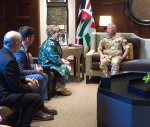You are here
Could it be the world is getting better?
Jan 01,2016 - Last updated at Jan 01,2016
We have much to be glum about as we come to the end of 2015; the latest is the killings of café patrons and music fans in Paris.
But we are brainwashed with bad news. “If it bleeds it leads.”
One plane crash is worth more airtime than news that we are winning the fight against early death.
The World Health Organisation has some telling facts.
Over the last two decades, infant deaths have fallen by a half — in 1960, one in five children died before the age of five, today it is one in twenty, and falling —measles deaths by three-quarters and both tuberculosis and maternal deaths by a half.
AIDS-related illnesses have been cut by over a quarter.
Developing countries have caught up far more quickly in health than in wealth.
For instance, Vietnam at present has the same health as the US had in 1980, but the same income per head as the US had in 1920.
Despite the Great Recession of the last seven years, poverty has plummeted. Although most of that drop happened in China and India, it also happened in most Third World countries.
Population growth is slowing. The amount of children in the world today is the most there is likely to be.
As Hans Rosling of Sweden’s Karolinska Institute told the BBC: “We have entered the age of the ‘Peak Child’.”
Education is spreading rapidly for girls. In Muslim Bangladesh, there are as many girls in school as boys. In Saudi Arabia, there are more young women in university than men, and their exam results are better.
Coming up in 2016 will be more war in Syria, Iraq, Afghanistan, Somalia and Sudan. Of that we can be sure.
There will probably be another year of “Cold Peace” between Russia and the West, unless the two sides can engineer a way out of the quite unnecessary Ukrainian imbroglio and find a way to work together to pull the rug from under Daesh.
The European Union might be thrown into disarray again if the British vote to leave it.
Action against malaria, other tropical diseases and global warming will be out of step with what is necessary.
But on balance, 2016 could be a good year.
We are outracing the “four horsemen”, extending the length of human life faster than pestilence, war, famine and death can take them.
Anti-immigrant political rhetoric and voting may be on an upswing, yet most Europeans responded to the influx of hundreds of thousands of refugees with a degree of unexpected equanimity.
It has long been intellectually fashionable to debunk the value of foreign aid. Yet the evidence is overwhelming that in most poor countries the great advances in medical care would not have been made without it.
Take the programme to fight AIDS in Africa, initiated by president George W. Bush: it paid for the successful treatment of over 5 million people.
These days, more and more of the richest men in America are donating large sums of money out of an altruistic commitment to help the poor get on their feet — and they are finding success.
Over the decades since the end of the Cold War, war has become less frequent and less deadly.
It is true that in the last few years, mainly because of Syria, Iraq, Sudan, Somalia and Afghanistan, the number of fatalities has shown an increase after years of decrease, but the world over, the downwards trend has continued.
Today, war is limited to only one relatively small corner of the world.
MIT Professor Steven Pinker, in his 2011 book “The Better Angels of Our Nature”, brought to light a treasure trove of data proving that the world has become much more peaceful.
Over the last 50 years, deaths in war have fallen from an annual 300 per 100,000 people to less than 1 per 100,000.
One reason for this was the fast spread of democracy and the well-proven fact that democracies do not go to war with each other.
At the end of World War II, there were less than 10 democracies in the world. Now they are commonplace.
According to Freedom House, which measures the ups and downs of democracy and human rights, 45 per cent of the world’s people are “free” and 30 per cent “partly free”.
That leaves only 25 per cent, which are unredeemed dictatorships. Most of that number is in China.
The Paris bombings, Daesh atrocities and setbacks in Afghanistan, bad news, are important, but not as important as this good news.
In 2016, we need a return to perspective. Our destiny is not down.













